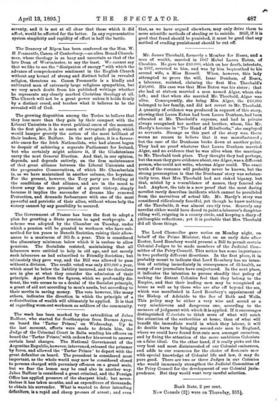Mr. James Theobald, formerly a Member for Essex, and a
man of wealth, married in 1867 Mabel Laura Eaton, of Cheshire. He gave her £40,000, which on her death, intestate, in 18S7, reverted to him, and was by him bequeathed to his second wife, a Miss Russell. When, however, this lady attempted to prove the will, Isaac Dunham, of Essex, a labourer, resisted, claiming the first Mrs. Theobald's £40,000. His case was that Miss Eaton was his sister; that she had at sixteen married a man named Alger, whom she left ; and that when she married Mr. Theobald, Alger was alive. Consequently, she being Mrs. Algar, the £40,000 belonged to her family, and did not revert to Mr. Theobald. A quantity of evidence was produced in support of this story, showing that Laura Eaton had been Laura Dunham, had been educated at Mr. Theobald's expense, and bad in private always recognised her mother and brother, whom, like Mr. Hardy's heroine in " The Hand of Ethelberta," she employed as servants. Strange as this part of the story was, there seems no reason to believe that it was manufactured ; but the case of the Dunhams broke down at another point. They had no proof whatever that Laura Dunham married Alger, and no evidence that he was alive when the marriage to Mr. Theobald took place. They thought they had perhaps, but the man they gave evidence about, one Alger, was a different person, who could not write, whereas Algar could. The exact truth of the romance will probably never be known, but the strong presumption is that the Dunhams' story was substan- tially true, that Mrs. Theobald had not risked bigamy, but that, misled by a resemblance of names, they fancied she had. Anyhow, the tale is a new proof that the most daring novelist rarely describes incidents which cannot be paralleled from the narratives of actual life. Mr. Hardy's story was considered ridiculously fanciful, yet though he knew nothing of the Theobalds, it was almost exactly true. Scarcely any novelist either would have dared to paint a labourer's daughter riding well, reigning in a county circle, and keeping a diary of philosophic reflections; yet it is probable that Mrs. Theobald did all those things.


































 Previous page
Previous page